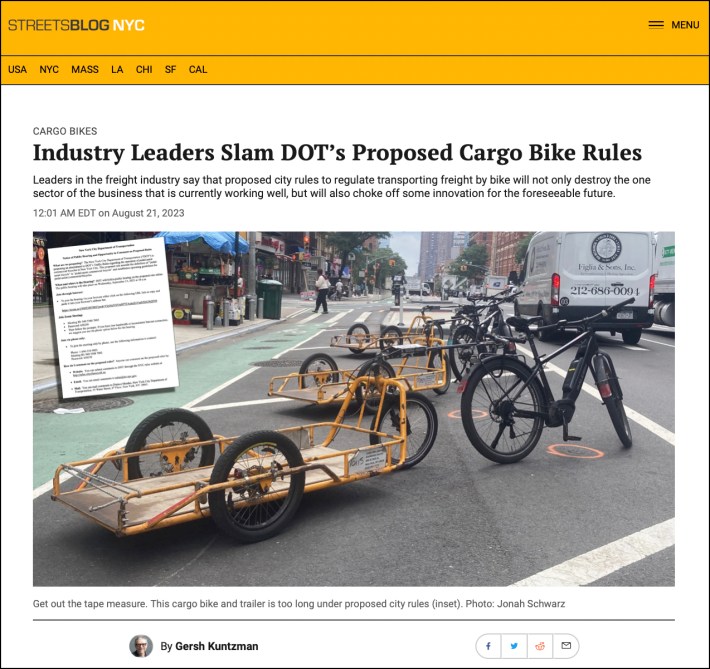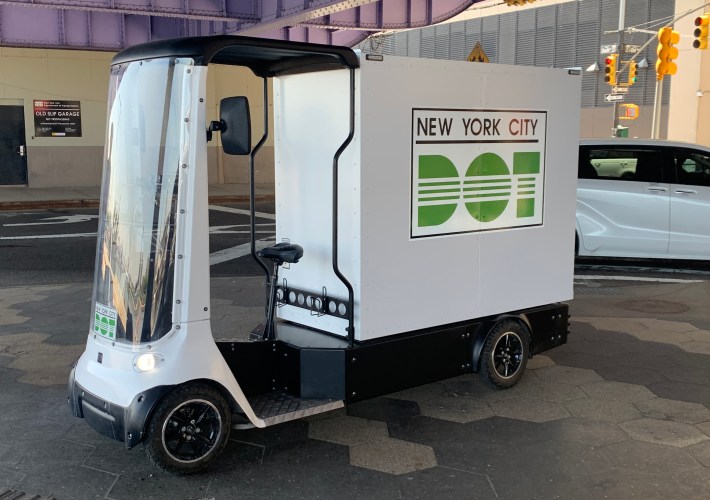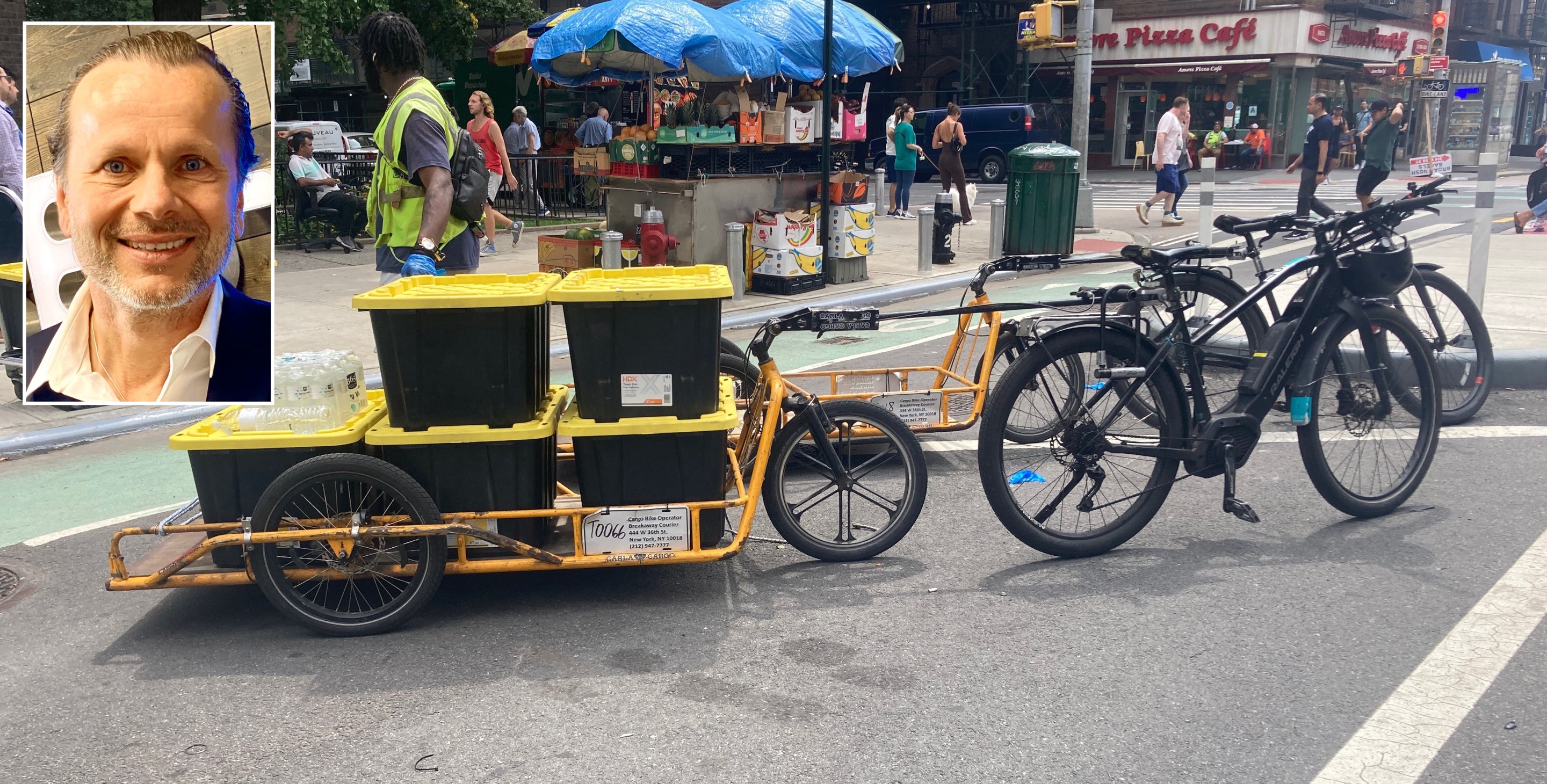Earlier this month, we broke the news that the Department of Transportation wants to change the rules governing the size of cargo bikes used for freight. But that story missed a key detail about the rules, prompting a follow-up that was filled with concern from the freight bike industry that the new proposed rules could stifle innovation and choke off the existing, and successful, Amazon/Whole Foods delivery business, which comprises the vast majority of freight deliveries by bike today. After reading that article, another industry leader came forward to complain about the DOT proposal with an open letter to the agency. It is published below.
The editors
Dear NYC DOT,
The city of New York has been a beacon of progress in the realm of sustainable delivery solutions. In 2019, NYC DOT initiated a cargo bike pilot program that kickstarted the widespread adoption of cargo bikes across the city. This spring, NYC DOT announced a delivery hub pilot program to amplify the opportunity and bring necessary step-down infrastructure into the city. These initiatives, along with the eagerly anticipated congestion pricing, are poised to further accelerate the transition from vans to cargo bikes in the heart of the city.
However, recent developments have left us deeply concerned. The DOT has recently proposed a rule that could effectively dismantle much of the progress made over the past four years, threatening the very existence of cargo bikes in our city. This rule, if enacted, would impose a maximum combined length of 120 inches for bikes and trailers. This restriction would render virtually all commercial-grade bike and trailer systems currently in use obsolete. Shorter trailers, we must emphasize, are not economically viable for eco-friendly delivery services. The proposed rule would shift the cargo volume of around 500 bike trailers back to traditional vans, which would further congest and pollute the city.

It appears that this rule was drafted without due consideration for the dominant cargo bike operators in the city. It seemingly aims to shift the market in favor of a four-wheeled quad, a form of transportation that, until now, has been illegal to operate under bicycle laws in the United States.
Beyond the disheartening prohibition of the prevailing cargo bike configuration, the proposed regulations contain several contentious provisions that not only hinder the free-market adoption of optimal solutions but also pose a potential threat to pedestrian safety.
- Increasing the speed limit for cargo bikes from 12 mph to 20 mph would result in a nearly threefold increase in braking distance. Given the close proximity of pedestrians and bikes in our city, and the occasional distraction of pedestrians stepping into bike lanes, this increase in speed limits for heavy cargo bikes poses a grave risk of serious injuries and potentially avoidable fatalities. We urge you to reconsider this change.
- The proposed rule seeks to outlaw throttles on cargo bikes, a feature common on Class 2 and Class 3 e-bikes, which has proven invaluable on cargo bikes. Starting off with a fully loaded bike, especially on inclines, can be an arduous task without a throttle. This feature not only reduces rider fatigue but also enhances their concentration in the often chaotic traffic of New York City. Eliminating throttles will make the rider's job more challenging and reduce their overall safety.
- In a surprising turn of events, the proposed rule specifically restricts the use of powered trailers behind bikes. We see this technology as a potential game-changer for enabling eco-friendly deliveries in hilly areas. We hope the DOT will prioritize road safety and take a technology-agnostic approach to regulation, allowing the market to determine which systems will thrive commercially.
- Lastly, the rule seeks to prohibit advertising on cargo bikes. This decision would have a significant impact on low-income, older, and disabled individuals who depend on deliveries for their daily needs. Advertising enables delivery providers to offset their costs and offer deliveries at subsidized rates while ensuring fair wages for the riders. Eliminating this source of revenue would not only add financial pressure on consumers but also on the riders who serve our communities.
This market-shifting rule was not included in DOT's annual rulemaking agenda published just last May, although DOT has recently promoted an eQuad, which stands to benefit most from these new rules, even as the four-wheel form factor is currently illegal to operate under existing bicycle rules. [Editor's note: The maker of the four-wheel bike insists that its bike is legal under non-bicycle rules.]

We urge you to reconsider the proposed rule to include the aforementioned changes and engage in a more inclusive and comprehensive dialogue with all stakeholders involved in sustainable delivery solutions. Let us work together to continue the positive trajectory towards greener, safer, and more efficient urban delivery systems.
Sincerely,
Sven Etzelsberger






